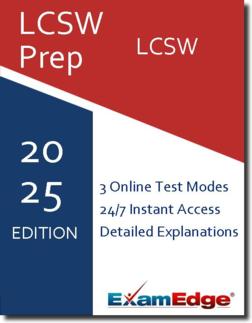LCSW (LCSW) Practice Tests & Test Prep by Exam Edge - Topics
Based on 25 Reviews
- Real Exam Simulation: Timed questions and matching content build comfort for your LCSW test day.
- Instant, 24/7 Access: Web-based Licensed Clinical Social Worker practice exams with no software needed.
- Clear Explanations: Step-by-step answers and explanations for your LCSW exam to strengthen understanding.
- Boosted Confidence: Reduces anxiety and improves test-taking skills to ace your Licensed Clinical Social Worker (LCSW).

Understanding the exact breakdown of the Licensed Clinical Social Worker test will help you know what to expect and how to most effectively prepare. The Licensed Clinical Social Worker has multiple-choice questions The exam will be broken down into the sections below:
| Licensed Clinical Social Worker Exam Blueprint | ||
|---|---|---|
| Domain Name | ||
| Biopsychosocial Assessment | ||
| Diagnostic Formulation | ||
| Treatment Planning | ||
| Resource Coordination | ||
| Therapeutic Interventions | ||
| Legal Mandates | ||
| Ethical Standards for Professional Conduct |


